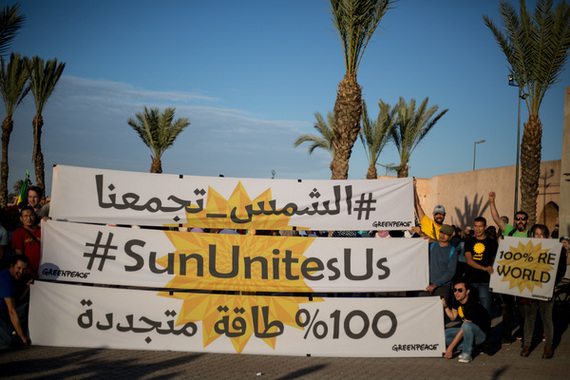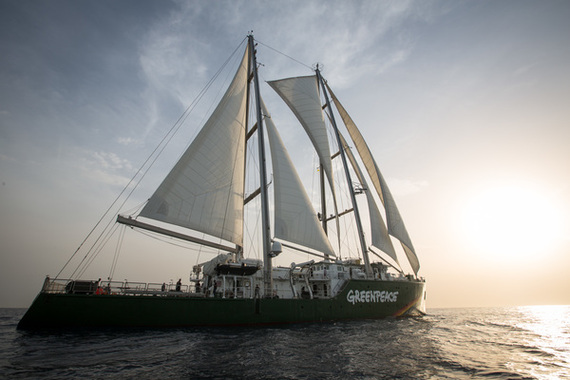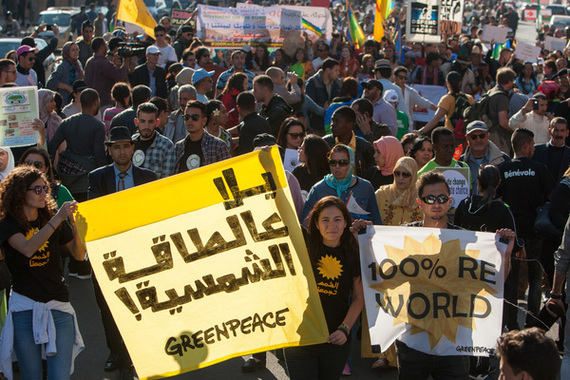I often get a shocked reaction when I tell people that I work on environmental issues in the Middle East and North Africa (MENA). People often ask me, how can people there prioritise environmental issues in a region known for its conflict? The answer is never quite simple. Due to an historic dependency on fossil fuels, the MENA region is among the most affected by climate change which causes pollution and contaminated water. Relentlessly increasing desertification has hurt farming. Local fisheries suffer from deteriorating water quality and changing sea temperatures.
This is a region where electricity consumption is growing rapidly; up 4.6% in 2015 for more than 370 million people. Domestic consumption of oil in the Middle East almost doubled between 2000 and 2015. This narrow-minded focus on oil and gas has led the IEA to predict that CO22 emissions from the region will also double between 2012 and 2050. Meanwhile, climate scientists have predicted that large areas could become uninhabitable because of extreme heat and water scarcity.
When we think about the MENA, the first thing that comes to mind is "oil". And, yes, while it is true that a few countries in the region have grown rich by exploiting fossil fuels, one should remember that every single MENA country stands to benefit from a much cleaner resource. One that is free and endless. The sun. It doesn't take much imagination to see the massive potential for solar energy in the region. We were raised in the light of it and we live our days beneath it.
The International Renewable Energy Agency (IRENA) believes that the MENA could attract $35 billion in renewable energy investments annually over the next four years. Solar projects alone grew from about $160 million in 2010 to $3.5 billion in 2015. Wind energy can also be included in these kinds of forward-thinking investments.
Even the Oil and Gas rich GCC countries (Gulf Cooperation Countries: Saudi Arabia, Kuwait, Bahrain, Qatar, UAE and Oman) could alone create 200,000 jobs in renewables by 2030, reduce their carbon footprint by 8% and water use by 16%.
With this in mind, the Greenpeace ship Rainbow Warrior did a tour across the Mediterranean this summer beneath a banner proclaiming the "SunUnitesUs". The campaign aimed to challenge the stereotypical story of a region suffering from violence and conflict and tells a new one, a story about local heroes striving to make their lives and their communities sustainable and safe under a glowing sun.
Morocco hosting this year's UN climate conference is no coincidence. The country can stand tall while welcoming world leaders to the 22nd COP. Of all the countries in the region, it is the one showing true leadership in developing renewable energy capacity.
Currently around 15% of electricity generation in Morocco is supplied by renewable sources. Earlier this year, it opened a solar thermal plant which will eventually produce enough electricity for a million people.
Morocco's energy policy involves a strong legal framework, the reformation of subsidies and building institutions that drive forward a sustainable energy future. They have also introduced an energy efficiency plan aimed at reducing energy consumption by 12% by 2020 and 15% by 2030. The government is also removing taxes on energy efficiency technologies, raising awareness and updating regulations to fit in with a clean energy infrastructure.
With the world attention on the climate negotiations in Morocco, together with everyone here who understands the power of renewables, we are celebrating the triumph of joy over despair. The renewable energy revolution we are witnessing is empowering people to be active in building solutions that make our world safe and more sustainable:
Auntie Kezban, one of my favorite advocates for renewables in Turkey, made us realise how simple the task is when she said, "If I can do it, you can do it." By the same token, if Morocco can do it, so can the other MENA countries.
Building a renewable energy future starts at home.
This post is part of a series produced by The Huffington Post, in conjunction with the U.N.'s 22nd Conference of the Parties (COP22) in Morocco (Nov. 7-18), aka the climate-change conference. The series will put a spotlight on climate-change issues and the conference itself. To view the entire series, visit here.


